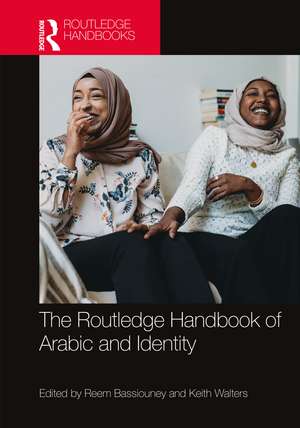The Routledge Handbook of Arabic and Identity
Editat de Reem Bassiouney, Keith Waltersen Limba Engleză Hardback – 4 sep 2020
Split into three parts, covering ‘Identity and Variation’, ‘Identity and Politics’ and ‘Identity Globalisation and Diversity’, it is the first of its kind to offer such a perspective on identity, linking the social world to identity construction and including issues pertaining to our current political and social context, including Arabic in the diaspora, Arabic as a minority language, pidgin and creoles, Arabic in the global age, Arabic and new media, Arabic and political discourse.
Scholars and students will find essential theories and methods that relate language to identity in this handbook. It is particularly of interest to scholars and students whose work is related to the Arab world, political science, modern political thought, Islam and social sciences including: general linguistics, sociolinguistics, discourse analysis, anthropological linguistics, anthropology, political science, sociology, psychology, literature media studies and Islamic studies.
| Toate formatele și edițiile | Preț | Express |
|---|---|---|
| Paperback (1) | 432.63 lei 6-8 săpt. | |
| Taylor & Francis – aug 2022 | 432.63 lei 6-8 săpt. | |
| Hardback (1) | 1551.17 lei 6-8 săpt. | |
| Taylor & Francis – 4 sep 2020 | 1551.17 lei 6-8 săpt. |
Preț: 1551.17 lei
Preț vechi: 1891.66 lei
-18% Nou
Puncte Express: 2327
Preț estimativ în valută:
296.81€ • 309.90$ • 245.65£
296.81€ • 309.90$ • 245.65£
Carte tipărită la comandă
Livrare economică 04-18 aprilie
Preluare comenzi: 021 569.72.76
Specificații
ISBN-13: 9781138303997
ISBN-10: 1138303992
Pagini: 292
Ilustrații: 11 Line drawings, black and white; 10 Halftones, black and white; 15 Tables, black and white; 21 Illustrations, black and white
Dimensiuni: 174 x 246 x 20 mm
Greutate: 0.64 kg
Ediția:1
Editura: Taylor & Francis
Colecția Routledge
Locul publicării:Oxford, United Kingdom
ISBN-10: 1138303992
Pagini: 292
Ilustrații: 11 Line drawings, black and white; 10 Halftones, black and white; 15 Tables, black and white; 21 Illustrations, black and white
Dimensiuni: 174 x 246 x 20 mm
Greutate: 0.64 kg
Ediția:1
Editura: Taylor & Francis
Colecția Routledge
Locul publicării:Oxford, United Kingdom
Cuprins
Table of Contents
Notes on the Contributors
List of Figures
List of Tables
Acknowledgements
Introduction and Overview
Introduction: The Arabic Language and Identity
Keith Walters
Part I - Identity and Variation
1. FromRajjaltoRayyal: Ideologies and shift among young Bedouins in Qatar
Rizwan Ahmad and Heba Al-Kababji
2. The emergence of a new national linguistic variety in Saudi Arabia: A perceptual dialectology account
Abdelaadim Bidaoui
4. The expression of rural and urban identities in Arabic
Luca D'Anna & Chiara Amoruso
Index
Notes on the Contributors
List of Figures
List of Tables
Acknowledgements
Introduction and Overview
Introduction: The Arabic Language and Identity
Keith Walters
Part I - Identity and Variation
1. FromRajjaltoRayyal: Ideologies and shift among young Bedouins in Qatar
Rizwan Ahmad and Heba Al-Kababji
2. The emergence of a new national linguistic variety in Saudi Arabia: A perceptual dialectology account
- Yousef Al-Rojaie
Abdelaadim Bidaoui
4. The expression of rural and urban identities in Arabic
- Ahmed Ech-Charfi
- Youssef Haddad
- Manal Ismail
- Lotfi Sayahi
- Nadia Shalaby
Part II - Identity and Politics
- Ashraf Abdelhay and Yasir Suleiman
- Amira Agameya
- Abdulkafi Albirini
- Muhammad Amara
- Muhammad Badarneh
- Yonatan Mendel
Part III - Identity Globalisation and Diversity
- Ahmad Al-Issa and Laila S. Dahan
- Alexandrine Barontini and Lauren Wagner
Luca D'Anna & Chiara Amoruso
Index
Notă biografică
Reem Bassiouney is a professor (and chair) at the American University in Cairo, Egypt. She has eight linguistics books to her name. She is the author of Functions of Code-Switching in Egypt (2006), Language and Identity in Modern Egypt (2014) and Arabic Sociolinguistics (2009; second edition 2020). Her edited volumes include The Routledge Handbook of Arabic Linguistics (co-editor with Benmamoun) and Identity and Dialect Performance (2017). She is also the editor and founder of the Routledge Studies in Language and Identity series. Bassiouney is also an award-winning novelist.
Keith Walters is Professor Emeritus from the Department of Applied Linguistics at Portland State University, Portland, Oregon, USA. During his career, he also held positions in the English Department at the Ohio State University and the Linguistics Department at the University of Texas–Austin. He has taught English as an additional language in the US, Tunisia, Guinea and the West Bank and helped train teachers in those countries, Morocco, Egypt and Vietnam. His research interests include codeswitching, diglossic switching, language ideologies, and language and nationalism as well as language and the law. An award-winning teacher, Walters is co-author of two widely used composition textbooks, Everything’s an Argument (8th edn) and Everyone’s an Author (3rd edn).
Keith Walters is Professor Emeritus from the Department of Applied Linguistics at Portland State University, Portland, Oregon, USA. During his career, he also held positions in the English Department at the Ohio State University and the Linguistics Department at the University of Texas–Austin. He has taught English as an additional language in the US, Tunisia, Guinea and the West Bank and helped train teachers in those countries, Morocco, Egypt and Vietnam. His research interests include codeswitching, diglossic switching, language ideologies, and language and nationalism as well as language and the law. An award-winning teacher, Walters is co-author of two widely used composition textbooks, Everything’s an Argument (8th edn) and Everyone’s an Author (3rd edn).
Descriere
The Routledge Handbook of Arabic and Identity offers a comprehensive and up to date account of studies that relate the Arabic language in its entirety to identity. This handbook offers new trajectories in understanding language and identity more generally and Arabic and identity in particular.
